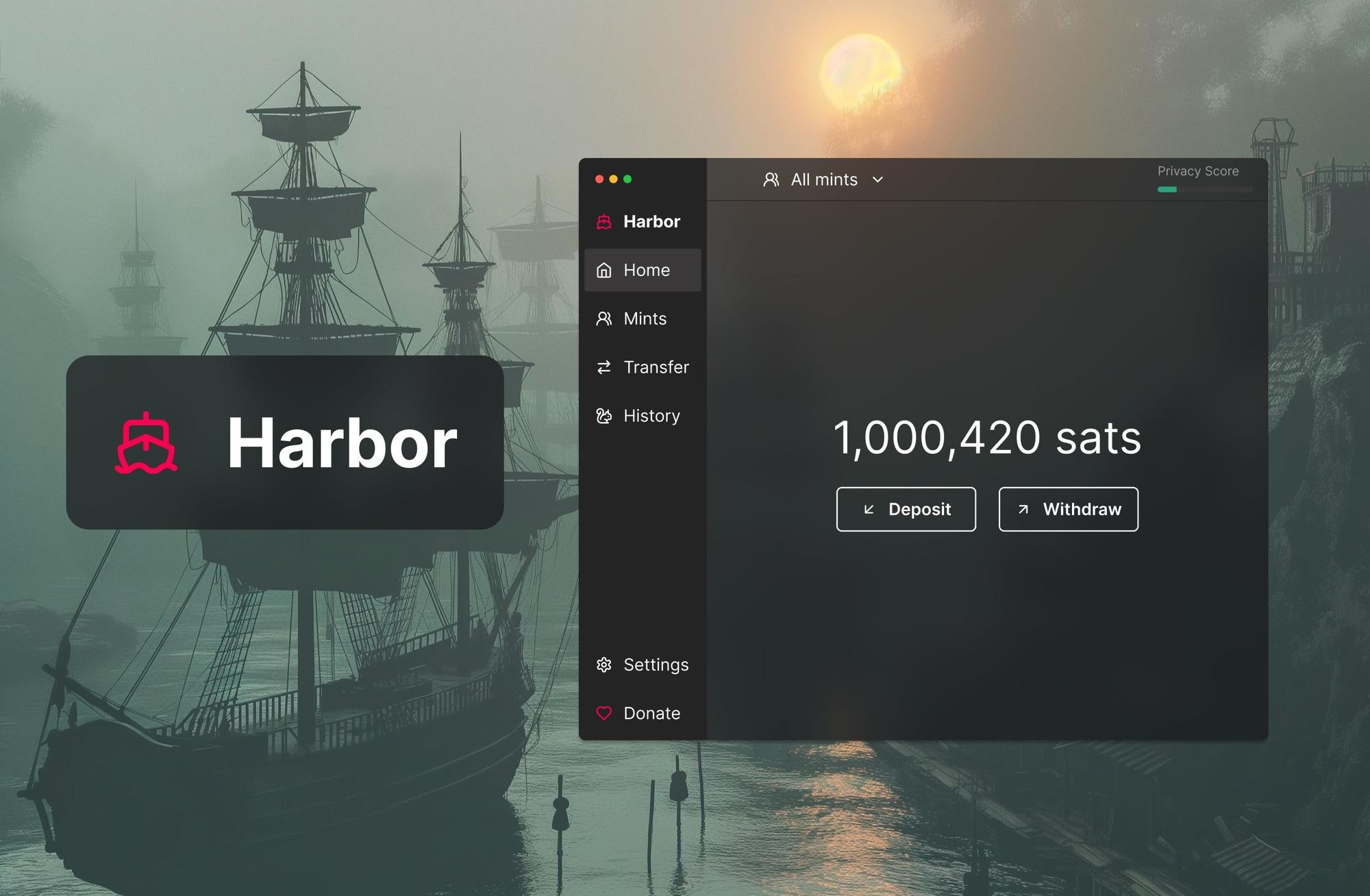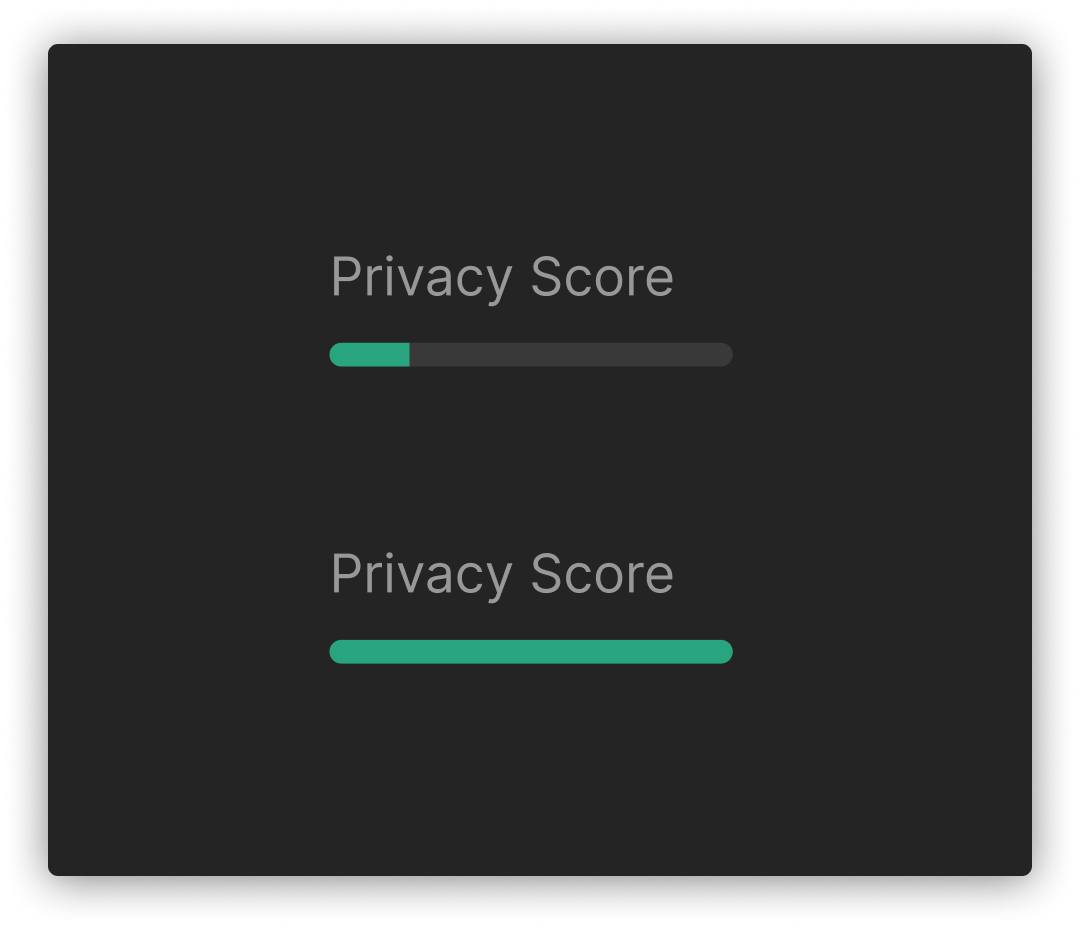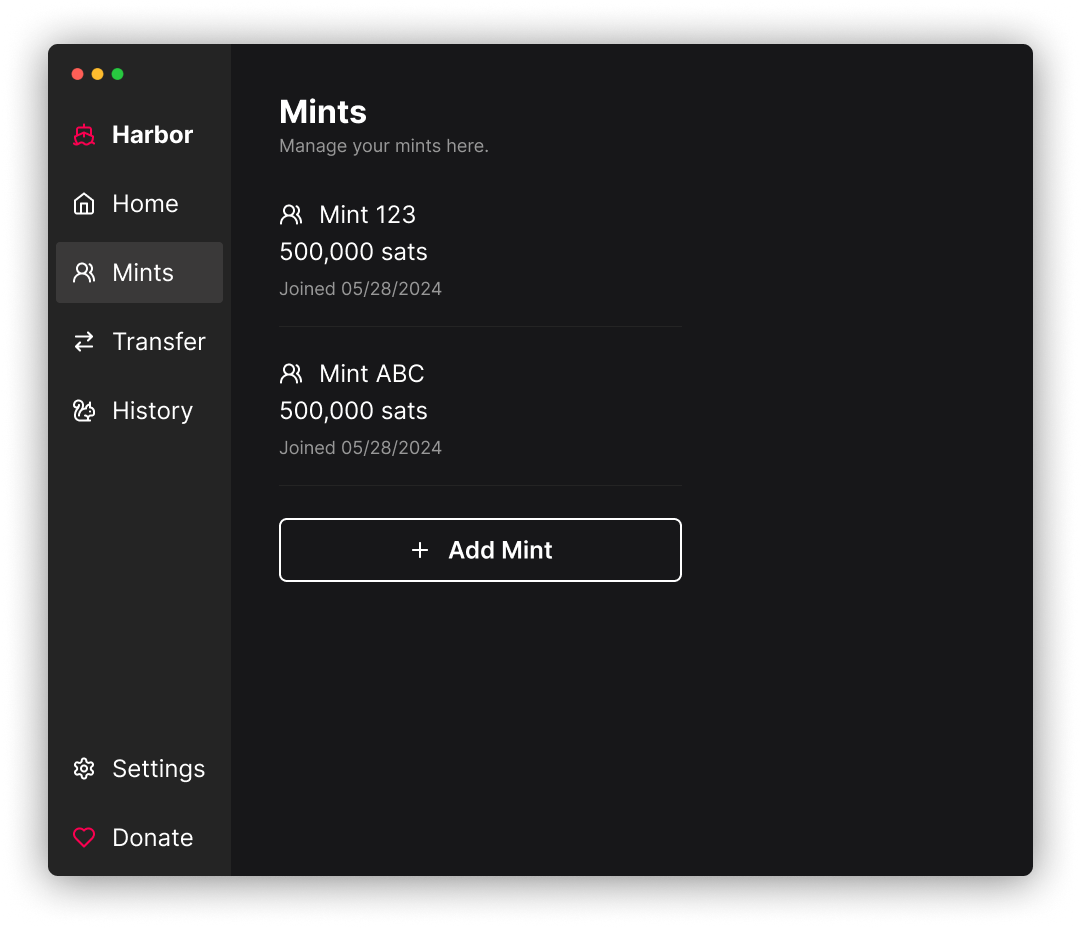Announcing Harbor
We're excited to announce our newest product, Harbor. Harbor is an ecash desktop wallet for better Bitcoin privacy.

Harbor - an ecash desktop wallet for better bitcoin privacy
Privacy is the core of what we believe in at Mutiny. It is a founding principle that compelled us to start the company in the first place. Unfortunately, our rights have deteriorated rapidly during the last few decades to the point where attempting to seek financial privacy is being outlawed and criminalized. We won't stand for this, but we acknowledge that as a company, we need to be strategic with what we build and how we build it to further this mission.
As mentioned on What Bitcoin Did this past week:
I'm going to stay and fight for what I believe in, this is my home, this is where I grew up…and, if you think you're going to run, usually it doesn't work out…if we don't do this then we kind of fail our country and fail our American Bitcoiners in the process.
With all of that said, I'm excited to announce our newest product, Harbor. Harbor is an ecash desktop wallet for better Bitcoin privacy.
With non-custodial coinjoin services being unlawfully targeted and criminalized, we need another method to seek our own privacy while the fight is underway. Fortunately, ecash is a highly functional yet incredibly private way to create a digital cash-like bearer asset.
What is ecash?
The best way to describe ecash is to think about how cash functions. You get dollar bills and can spend or transfer them peer-to-peer. You may deposit them into a bank and use them to interact with networks such as Visa, ACH, and Zelle.
Ecash was created decades ago to have a digital bearer asset representing dollars in a bank account. The same can now be done on top of Bitcoin. Bitcoin-based ecash is used either through a single custodian/bank-like protocol called Cashu or decentralized/federated networks of nodes running the Fedimint software. Both implementations allow you to exchange Bitcoin for ecash notes and vice versa. Each specific mint is unique, so their notes do not naturally provide interoperability across each other. However, that's the beautiful thing about a payment network like Bitcoin & Lightning to provide the glue between mints.
Our experiences with ecash
For the last six months, we have been utilizing Fedimint in Mutiny Wallet to create a better lightning-based user experience free of high fees, unexpected channel closes, high minimum fund requirements, etc.
Users are excited about it. New Fedimint connections in the first month nearly doubled the number of new lightning channel openings over the past year. Our experiences, knowledge, and feedback from Mutiny Wallet users made us want to create Harbor. Due to the market timings, building it now is even more critical.
What is Harbor?
At its core, Harbor is a desktop ecash wallet capable of sending and receiving Bitcoin. Using Harbor will feel like using many Bitcoin wallets you already know.

So, what makes Harbor different from our Fedimint-based Mutiny Wallet or other ecash-based wallets? I'll summarize it with three main distinctions: Privacy, multi-mint, and automation.
Privacy
While ecash is a private bearer asset in itself, more work and safety must be done to ensure that the user can utilize all of the privacy benefits that ecash features. Harbor will be Tor-only and will not depend on other network connections for anything besides the ecash mints. This is key to the longevity of Harbor to have no dependencies on centralized coordinators or even the developers. This is code users run themselves to connect to their own mints privately with no middlemen.

We'll also be providing an internal privacy score to the overall privacy health of your ecash. This score will be based on the longevity of your notes and your mints' overall activity.
Multi-mint

To minimize risk and exposure to a single mint, Harbor will allow you to add multiple mints and distribute funds across many of them. This helps you limit the loss of funds if a mint stops functioning. Further, we plan to support Cashu and Fedimint, giving users the most control and optionality.
Automation

Lastly, we're explicitly choosing to make this a desktop-only experience to take advantage of several automation features that require it to run in long intervals. We eventually want to make it capable of running on always-online devices like Start9.
Background automation will allow us to fully utilize the multi-mint feature to provide the most privacy features. These include the automatic distribution of funds across mints at different intervals. This is important because the timing and amount analysis still apply to ecash. We also want to have Bitcoin automatically transferred to a hardware wallet once the desired privacy levels are reached.
The Harbor Experience
Harbor will be much like other straightforward Bitcoin wallets. First, you'll create a new wallet in Harbor and set an encryption password. Then, you'll add a mint to use (you can find one on bitcoinmints.com). Afterward, you can deposit and withdraw through either Lightning or on-chain.
Lastly, you may leave your funds on Harbor until the desired privacy levels are reached, as indicated by the Privacy Score at the top right of the application. The bigger the deposit, the longer you should wait before fully withdrawing. You can add additional mints and set automations while you wait, though this is optional.
That's it! It's recommended that you leave only a small portion of your funds on any one mint, so it's best to withdraw most of them to your preferred on-chain or lightning wallet. Harbor is intended to be something other than your long-lasting cold storage solution. Though you can at least leave typical spending amounts on Harbor, ideally distributed across multiple mints.
We'll create a tutorial walkthrough when it is ready, but I hope this illustrates our vision for using Harbor.
Roadmap
Harbor isn't ready for mainnet yet, but you can go ahead and start playing around with the wallet on our testing Signet network. It's already fully open-sourced, so if you'd like to contribute, we would gladly welcome any help.
Many features are still needed before launch:
- Tor support
- A thorough privacy score algorithm
- Multi-mint support
- Mainnet testing
Some longer-term features we'd like to get to:
- Automation
- Built-in donations
- Cashu support
- Start9 support
Feedback & Support
A product like this is unique, and we need all the feedback, help, and support we can get. We believe in building a tool like this out in the open as fully open-sourced MIT code that is freely available and does not depend on a centralized coordinator or single developer. However, we're unable to gain insights into how people use this tool, whether users like it or how many users even exist.
Therefore, we need your help. For one, we need feedback. Do you want to use a tool like this? What features are most important to you, and what do you want? Please use the discussion boards on GitHub or the Harbor channel on our Discord. This will primarily drive the Harbor feature set.
Building free and open-source software is not free to us developers. While we believe in this tool's mission, we must rely on donations. We cannot profit from transactions for this service, and it must be fully open-sourced for this community to use it. We set up a Geyser funding page for this. Any donations are greatly appreciated for funding its development and signaling that it's a valuable tool to you.
Conclusion
With everything happening in the world right now, a tool like Harbor is needed now more than ever. We have the right to seek our privacy. This is one of the best ways to attain that with no single centralized coordinator or intermediary besides the mints themselves. Let us know what you think of this, and if you can help fund its development, it would go a long way for us as a very small team. Thank you!

